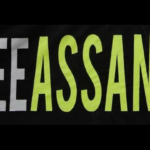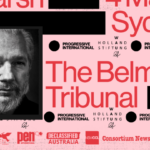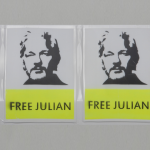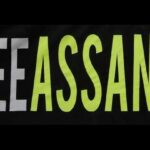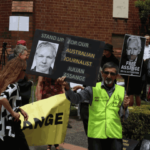“Doing the Bidding of the United States”: Senator Shoebridge on the Dan Duggan Extradition

During the 4th of March Sydney Belmarsh Tribunal into the ongoing incarceration of WikiLeaks founder Julian Assange in a London prison whilst the United States seeks to extradite the Australian publisher, Greens Senator David Shoebridge raised a case with striking similarities.
“It would be remiss of me not to note the other current example of Dan Duggan,” he said, “an Australian citizen who, as we speak, just a few short kilometres from here is in maximum security detention, in solitary confinement, following an extradition request from the United States.”
Duggan, an Australian citizen since 2012 and a former US marine fighter pilot, was arrested by the AFP at the behest of Washington last October, over allegations that whilst working at a flying academy in South Africa over 2010 to 2012, he trained some Chinese military pilots to fly fighter jets.
Having served in the US marines between 1989 and 2002, 54-year-old Duggan has been classed as an “extreme high risk” inmate, along with those incarcerated on terrorism charges, and he’s being held in isolation in a restricted area of the Metropolitan Remand and Reception Centre in Silverwater.
And while attorney general Mark Dreyfus has agreed to the extradition request, meaning Duggan’s lawyers now have to show reasons as to why he shouldn’t be handed over, there are numerous unanswered questions surrounding the case, including why our nation has been so willing to comply.
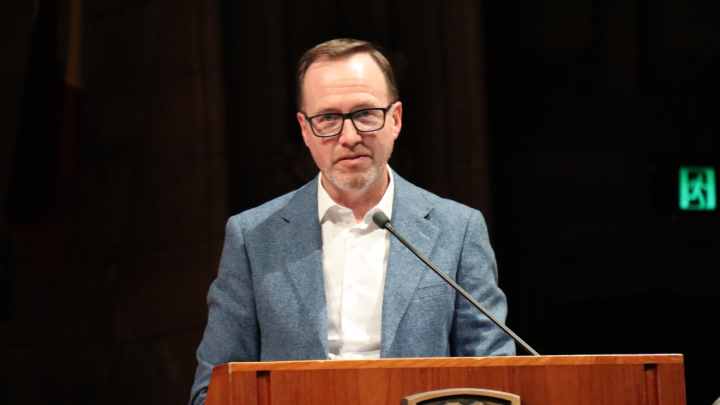
Extreme detention
“This is an Australian citizen, who’s never previously been charged with, let alone convicted of, a crime either in Australia or the rest of the world,” said Shoebridge. “He has a family and a farming enterprise in Australia. And he has deep roots and links to our community.”
“The alleged crimes are not crimes of violence. And there is no indication that he would be a flight risk,” he continued. “It’s impossible to understand on what basis he’s being held on remand, in some of the most onerous and abusive detention conditions, while awaiting trial for extradition.”
Not only is Duggan being held in extreme isolation, but he’s also being shackled when moved around the prison, and it’s uncertain who gave the order for such harsh treatment.
Indeed, similar to Assange in the UK, it would appear that local authorities are punishing him whilst in their custody.
After he became a citizen, Duggan and his now wife, Saffrine, moved to China, where he worked as an aviation consultant, and he then returned to this country last year.
While his lawyers have stated that the US and local governments have been resistant in supplying evidentiary documents since his incarceration.
“It is inconceivable that this is happening to an Australian citizen at the request of a foreign government on our shores,” Shoebridge further told Sydney Criminal Lawyers.
A question of jurisdiction
Unsealed in December, a 2017 US District of Columbia grand jury indictment alleges Duggan trained Chinese military pilots at a South African flight test academy, in exchange for $116,000, with charges involving the illegal export of defence services, arms trafficking and conspiracy to launder money.
“There is a saying in the United States justice system, that a grand jury would indict a ham sandwich,” remarked Shoebridge. “It’s a very low threshold. And it’s particularly low if there has been a politicised prosecutor driving the indictment.”
The senator explained that beyond the indictment produced under Trump, few details identifying the conduct said to have breached US law have been provided to Duggan’s legal team, although some of this is said to have been collected from his publicly broadcast motivational speeches.
“The fact that a Trump era political prosecution is continuing under the Biden administration, with the support of the Albanese government, should trouble us all,” said Shoebridge.
“One of the questions that hasn’t been answered by the Australian attorney general is what are the parallel charges known to Australian law that would justify the decision to agree to extradition.”
A key stipulation for an extradition request to be approved, as Dreyfus has already provided to that relating to Duggan, is that the conduct allegedly breaching the law of the foreign jurisdiction must also be illegal under domestic Australian criminal law, rather than under our military law.
Shoebridge explained it’s especially unclear whether similar crimes appear on the local books, as defence minister Richard Marles has recently confirmed there are no legal constraints preventing Australian pilots from partaking in the training of foreign pilots, unless they disclose official secrets.
“That explanation is required of the attorney general, and it should be public,” the Greens senator underscored.
Sowing the seeds of war
The fact that the Duggan allegations have come at a time when the US, UK and Australia are gearing up for war on China cannot be overlooked.
At the time of writing, Albanese is in California having just launched the details of the AUKUS pact, which involves Australia purchasing US nuclear-powered submarines and permitting US and UK subs to rotate through this country, which all clearly targets the East Asian giant.
“I don’t think it’s just a coincidence that the scare campaign about links with China coincides with the Australian government trying to persuade the Australian public to spend hundreds of billions of dollars on US and UK weaponry targeted at China,” Shoebridge continued.
The US arrest of Daniel Duggan by proxy on Australian soil coincided with claims from the British government that it had discovered 30 former UK fighter pilots had been lured to China with close to half a million dollar contracts to train local pilots in that country.
Marles said at the time that he had ordered his department to investigate whether a similar practice was taking place in relation to Australian pilots.
However, the practice of US, UK and perhaps Australian pilots training their Chinese counterparts has been occurring for at least a decade and the fact that it’s being criminalised to such a heightened degree now is clearly a recent occurrence.
“There is a concerted, multilayered political campaign by our government and the US government to persuade the Australian public to divert hundreds of billions of public money from core services into the global weapons industry and to underpin this is a fear campaign directed at China,” said Shoebridge.
The little US of A
The essential message delivered by the speakers at the Belmarsh Tribunal in Sydney was that the Albanese government is not doing enough to secure the release of Australian citizen Julian Assange, which has left him languishing in often extreme isolation in a UK gaol awaiting extradition.
But, again, in striking similarity, the Australian government is now remanding an Australian citizen in its own prison facility on behalf of the US government.
“I don’t think it is an unreasonable expectation for Australians that if an Australian citizen is being targeted by a foreign government that the Australian government’s first interest should be in protecting the rights of our citizens,” Senator Shoebridge set out.
Belmarsh Tribunal co-chair Mark Davis read out a statement at the event that had been penned by Duggan in Silverwater gaol. The local lawyer explained that despite the political prisoner having limited contact with the outside world, he took the time to dictate the message for the tribunal.
Duggan outlined in relation to Assange that “Australia’s sovereignty comes into question by politically motivated extradition requests of Australian citizens by any foreign state regardless of their might”, and he added that this nation must deny such requests.
“Unfortunately, with Dan Duggan, as we’ve seen previously with Julian Assange and others, it appears the Australian government’s first interest is in doing the bidding of the United States,” Shoebridge said in conclusion.
“This is an unsettling pattern that doesn’t seem to be changed whether we have a Coalition or a Labor government in Canberra.”


